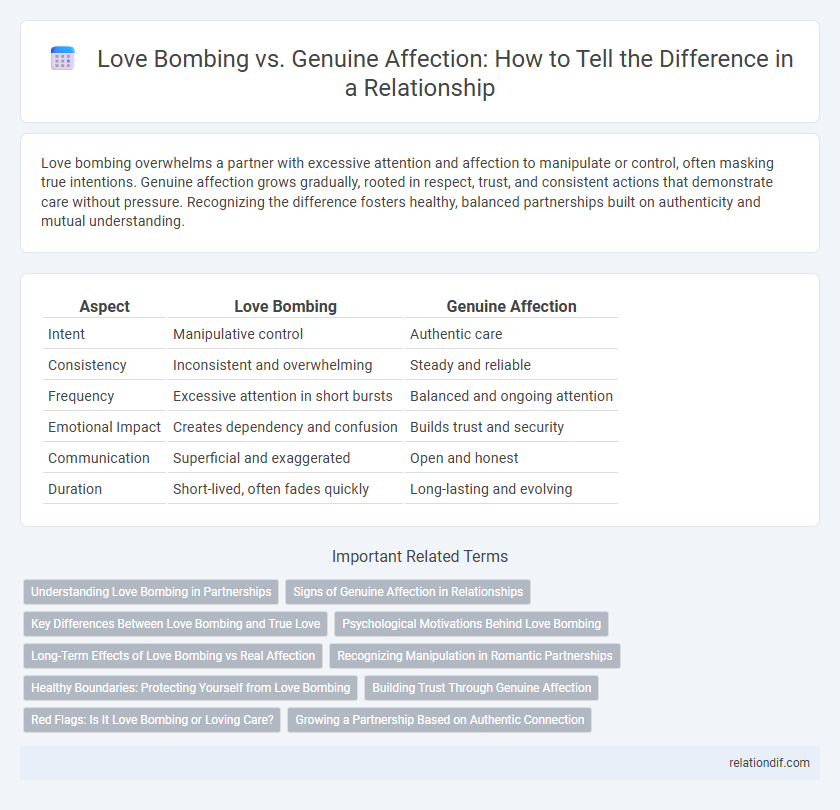Love bombing overwhelms a partner with excessive attention and affection to manipulate or control, often masking true intentions. Genuine affection grows gradually, rooted in respect, trust, and consistent actions that demonstrate care without pressure. Recognizing the difference fosters healthy, balanced partnerships built on authenticity and mutual understanding.
Table of Comparison
| Aspect | Love Bombing | Genuine Affection |
|---|---|---|
| Intent | Manipulative control | Authentic care |
| Consistency | Inconsistent and overwhelming | Steady and reliable |
| Frequency | Excessive attention in short bursts | Balanced and ongoing attention |
| Emotional Impact | Creates dependency and confusion | Builds trust and security |
| Communication | Superficial and exaggerated | Open and honest |
| Duration | Short-lived, often fades quickly | Long-lasting and evolving |
Understanding Love Bombing in Partnerships
Love bombing in partnerships is characterized by overwhelming displays of affection intended to manipulate or control, rather than genuine emotional connection. Recognizing excessive flattery, rapid commitment, and inconsistent behavior helps distinguish love bombing from authentic affection. Understanding these patterns safeguards emotional well-being and promotes healthier, more balanced relationships.
Signs of Genuine Affection in Relationships
Genuine affection in relationships is marked by consistent, respectful communication and a deep understanding of each other's needs without overwhelming intensity. Emotional support, active listening, and healthy boundaries distinguish authentic care from manipulative love bombing tactics. True affection grows steadily and fosters mutual trust, unlike the sudden, excessive attention typical of love bombing.
Key Differences Between Love Bombing and True Love
Love bombing involves overwhelming a partner with excessive attention and grandiose gestures early in the relationship to gain control, whereas genuine affection develops gradually through consistent, respectful actions that build trust. True love emphasizes emotional stability, mutual understanding, and long-term commitment, while love bombing often fades once control is established, revealing manipulation. Understanding these distinctions aids individuals in identifying healthy partnerships versus toxic dynamics.
Psychological Motivations Behind Love Bombing
Love bombing often stems from psychological motivations such as insecurity, fear of abandonment, or a desire to control and manipulate a partner through overwhelming displays of affection. This behavior contrasts with genuine affection, which is grounded in consistent, respectful, and reciprocal emotional support, fostering trust and healthy bond development. Understanding the psychological roots of love bombing aids in identifying manipulative patterns and promoting authentic relationship dynamics.
Long-Term Effects of Love Bombing vs Real Affection
Love bombing often leads to emotional burnout and trust issues due to its overwhelming and insincere nature, creating instability in long-term partnerships. Genuine affection fosters strong emotional bonds, consistent trust, and resilience, contributing to sustained relationship satisfaction. Understanding these contrasting effects is crucial for building healthy, lasting connections.
Recognizing Manipulation in Romantic Partnerships
Love bombing often involves excessive attention and flattery early in a relationship to gain control, signaling potential manipulation rather than genuine affection. Genuine affection grows steadily through consistent actions, mutual respect, and emotional support over time. Recognizing manipulation requires observing patterns of behavior, such as sudden intensity followed by withdrawal or controlling tendencies disguised as care.
Healthy Boundaries: Protecting Yourself from Love Bombing
Setting and maintaining healthy boundaries is crucial to distinguish genuine affection from love bombing in partnerships. Love bombing often involves overwhelming gestures intended to manipulate emotions, while authentic affection respects personal space and individual pace. Recognizing warning signs and asserting clear limits help protect emotional well-being and foster trust in a healthy relationship.
Building Trust Through Genuine Affection
Building trust in a partnership requires distinguishing genuine affection from love bombing, which often involves overwhelming gestures that lack sincerity. Genuine affection is consistent, respectful, and attentive to a partner's needs, fostering emotional security over time. Trust deepens when actions align with words, creating a stable foundation for lasting intimacy.
Red Flags: Is It Love Bombing or Loving Care?
Love bombing often involves overwhelming attention and excessive praise early in a relationship, signaling manipulation rather than genuine affection. Red flags include inconsistency, rapid escalation of intimacy, and pressure for quick commitment, contrasting with the steady, respectful care found in authentic partnerships. Genuine affection builds trust through consistent, thoughtful actions that prioritize mutual well-being without creating emotional dependency.
Growing a Partnership Based on Authentic Connection
Love bombing often involves overwhelming displays of affection that can manipulate emotions, while genuine affection is consistent, respectful, and rooted in understanding. A partnership built on authentic connection fosters trust through open communication and shared values, strengthening emotional intimacy over time. Prioritizing sincere expressions of care and mutual support creates a stable foundation for lasting growth and deep bonding.
Love Bombing vs Genuine Affection Infographic

 relationdif.com
relationdif.com